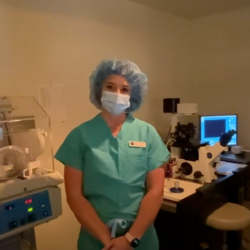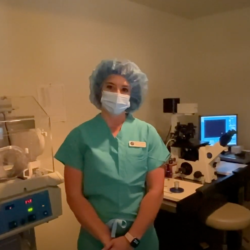Exercise and a proper diet will help increase fertility during In Vitro Fertilization (IVF), but how much exercise is the right amount? Research suggests that there is a correlation between women who have a healthy weight (a BMI of 19 to 24 but no more than 29) and an increased IVF success rate. But the relationship between exercise and IVF can be very tricky. While some exercise is good, too much exercise – particularly cardiovascular activities – seem to have a negative effect on reproductive hormone production, and that affects the ability to conceive.
Some exercises are more conducive to a successful IVF cycle and a healthy pregnancy than others, depending on the intensity level and level of risk. A 2006 study published by Obstetrics & Gynecology found that out of 2232 women who exercised for 1-9 years prior to their IVF cycle, the “women who reported exercising 4 hours or more per week for 1-9 years were 40% less likely to have a live birth and were almost three times more likely to experience cycle cancellation and twice as likely to have an implantation failure or pregnancy loss than women who did not report exercise.”
In vitro fertilization, or IVF, is highly successful in helping patients achieve a healthy pregnancy. However, in order to help ensure the success of treatment, it is important to maintain the right balance between exercising to maintain your optimal weight but not harm your chances of conception. Here are 6 ways to ensure that exercise works for, instead of against, your chances for conception.
- Keep Your Exercise Routine to a Low-Impact Maximum. Although it may be frustrating to change your long-standing exercise routine, it is important that you avoid all unnecessary risks of IVF treatment so that you can continue to increase your odds for a successful pregnancy. Higher exercise levels seem to affect the ability for the embryo to implant and also increase the chances of pregnancy loss. Also, for women who develop enlarged ovaries as a result of the hormone therapies, high impact exercises may lead to ovarian torsion, a condition in which the ovary twists on itself.
- Take it easy. If you are a regular runner, biker, or participate in workout regimens designed for moderate/advanced athletes, paring down your routine during the months preceding, during and after your IVF cycle may increase your chances for a successful pregnancy. Studies show that there is a correlation between increased physical activity and decreased rates of conception for the “athlete” population. Keep your cardio workouts to no more than 4 hours per week and fill in the gaps with lower-intensity options that still increase strength and flexibility, like yoga, water exercise, or tai chi.
- Opt for “no exercise” during the week of egg retrieval. Because of the potential side effects of fertility medications (bloating, fatigue, and mild discomfort), you may not feel up to exercising anyway. Each individual case is different, so if you feel you must exercise, just make sure you listen to your body and do not push it.
- Find other ways to relieve stress. For many people, exercise is as much about the stress relief and endorphin rush as it is about weight loss or overall health. That makes this the perfect time to find new ways to reduce or eliminate stress. Activities such as getting a fertility massage, getting acupuncture or meditating are great ways to relieve stress and will also promote your overall wellbeing.
- Take the long view. Instead of being upset that you will have to give up your exercise routine, think of your final goal, bringing a baby into your life. The months you spend cutting back on exercise now will be well worth the final results.
Most women going through in vitro fertilization can return to their normal activities soon after embryo transfer. Implantation usually occurs three to five days following embryo transfer and once pregnancy is confirmed, you can usually return to your normal fitness routine. At the Fertility Institute, our physicians are always here to answer your questions regarding IVF treatments. To learn more, schedule an appointment with one of our fertility experts at your earliest convenience.



